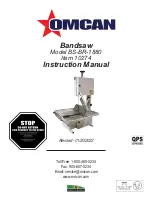
9
www.evolutionproject.com
TWIN
125
INSTALLING/REMOVING THE TCT BLADES
NOTE:
It is recommended that the operator considers
wearing protective gloves when handling the blades during
installation or when changing the blades.
1. Installation
1. Ensure that the machine is not connected to any power
source.
2. Lay the saw down on a bench with the blade arbor
pointing upwards.
3. Open the lower guard (see
fig 2
)
4. Place blade A onto the flange with the letter ‘A’ clearly
visible (see
fig 1
)
5. Align the two offset cut-outs in the blade with the drive
pins on the flange and securely fit the blade onto the flange.
6. Place blade ‘B’ onto the adaptor with the letter ‘B’ clearly
visible, and then thread the locknut onto the shaft. (see
fig 3
)
HAND TIGHTEN only.
7. Turn the blades so that the holes in both blades are lined up.
8. Place the pin (included with the wrench) into the aligned
holes.
9. Tighten the locknut clockwise with a wrench, and then
remove the pin from the blades (see
fig 4
). This will allow
the blades to rotate freely.
10. Carefully turn the blades by hand to ensure that they
rotate easily in opposite directions.
2. Removal
1. Ensure that the machine is disconnected from the mains
supply.
2. Allow the blades to cool.
3. Rotate the blades until the holes in both blades are in
alignment.
4. Place the pin attached to the wrench through the holes
in the blades.
5. Unscrew the locknut by rotating it counter clockwise, and
remove it (see fig 4).
6. Open the lower guard (see
fig 2
)
7. Lift and remove blade ‘B’.
8. Lift and remove blade ‘A’.
CUTTING PROCEDURES
1. Mark out the material to be cut (use an appropriate pencil
etc) with clear, precise cutting lines.
2. Offer the saw up to the material to be cut and align the
blades with a pre-marked cutting line. Do not start the
machine until correct alignment has been achieved
3. Ensuring that the blades are not touching the material to
be cut, turn on the machine and allow to run up to full speed.
4. Gently feed the saw blades into the workpiece. Cutting can
be preformed smoothly if you cut straight ahead and allow
the saw time to work without forcing or pressing the blade.
CAUTION
• Always check the TCT blades before starting work.
• Never use a cracked, broken or bent TCT blade.
• Do not apply water or coolant to a TCT blade.
• Start cutting only when the machine reaches full operating
speed.
• If the blade seizes or there is any abnormal noise,
immediately turn the power off.
• Never use a TCT blade to cut zig zag or curved lines.
• Never use the side surface of the TCT blade. Never use to
perform inclination cutting.
• If excessive force is applied to the TCT blade to make
it align with a pre-marked line during cutting, this could
overload the motor, cause burn damage and may overheat
the blades and shorten their service life.
• Take care not to allow the machines power cord to come
into contact with the rotating TCT blades during cutting
operations.
• Support the workpiece in such a way that it is possible to
predict what will happen, and so that the cut remains open
while cutting.
• Feed the machine down in line with the blades. Sideways
pressure on the blades can damage them and can be
dangerous.
• When the work is completed, turn off the power and
disconnect the power plug from the power supply.
CUTTING CROSS SECTIONAL MATERIALS
The life span of the blades and the quality of the cutting edge
is dependent upon vibration being kept to a minimum. For
this reason the material should always be clamped in place
before work begins.
Flat bar iron
The blade is fed at an angle of 90
0
to the work surface
(see
fig 5
).
Corner piece
The blade is fed diagonally through the work surface
(see
fig 6
).
Rectangular pipe
The blade is fed from corner to corner (see
fig 7
).
U Section
The blade is fed from corner to corner (see
fig 8
)
GB
DE
NL
FR
Summary of Contents for FURYTWIN125
Page 42: ...42 www evolutionproject com ...
Page 43: ...43 www evolutionproject com TWIN125 ...
Page 44: ... ...










































